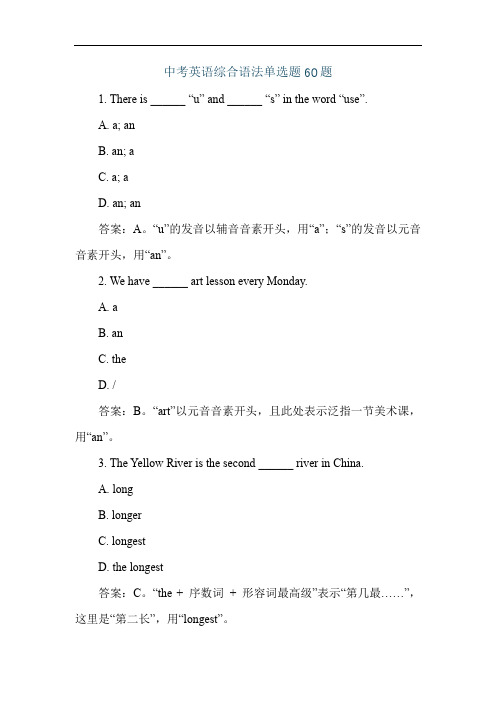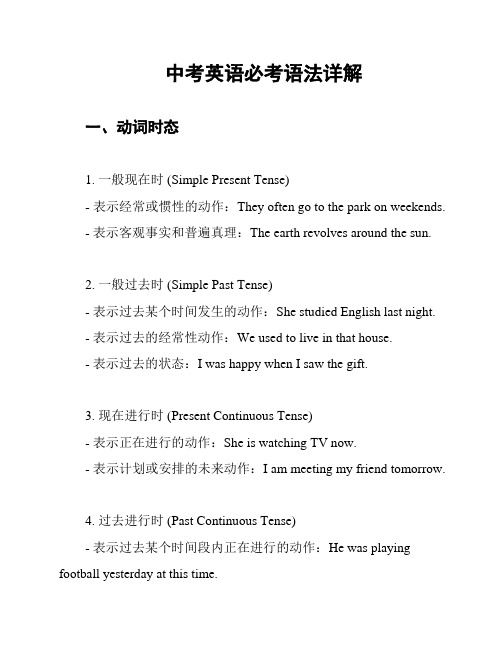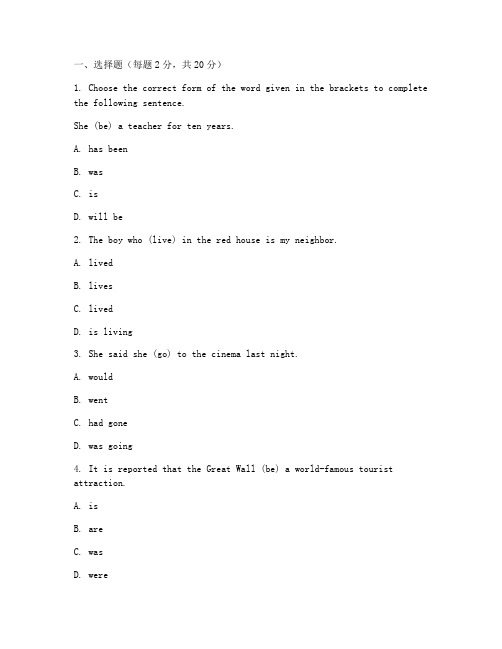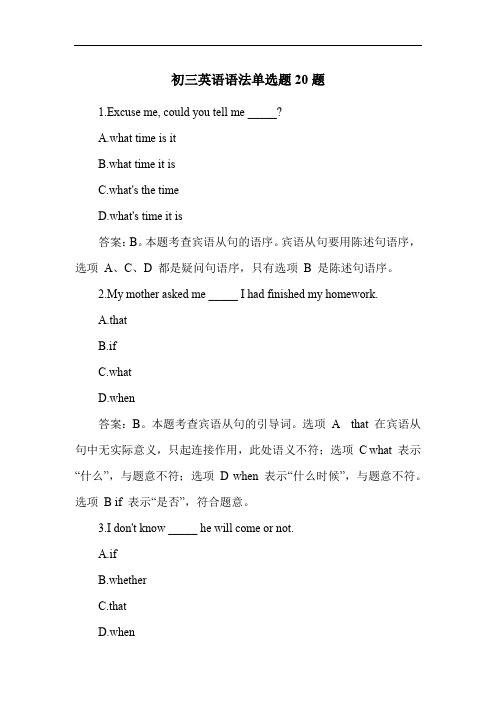中考英语常考语法题型
(必考题)中考英语常用语法知识——名词知识点(答案解析)

一、选择题1.Jim and I know her last name.A.am not B.isn’tC.aren’t D.don’t D解析:D【解析】试题分析:句意:吉姆和我都不知道她的姓。
分析:know为实义动词,因此改为否定句时,要借助于助动词do.因此选择第四项正确。
故选 C考点:考查主谓一致。
2.The newspaper came just now. I ________it yet.A.has read B.have read C.hasn’t read D.haven’t read D解析:D【解析】【详解】句意:刚刚报纸到了,我还没有读。
考查现在完成时。
四个选项都是现在完成时的形式。
根据题干结合选项可知此处要用现在完成时;由主语I可知要用助动词have,再结合题干中“yet”可知此处是否定句,用haven’t read符合题意。
故选D。
3.--- Mum, there's no milk in the fridge.一Oh; but there ____________ two bottles of apple juice in it.A.are B.isn't C.aren't D.is A解析:A【解析】【详解】句意:——妈妈,冰箱里没有牛奶了。
——哦;但是里面有两瓶苹果汁。
考查there be结构。
there be结构遵循就近原则,two bottles两瓶,系词需用are;but表转折,根据句意语境,可知本句是肯定句,故选A。
4.Mr. White __________ the blue trousers because __________his shirt well.A.likes; they don't match B.doesn’t like; they don’t match C.likes; it matches D.doesn't like; it matches B解析:B【解析】【详解】句意:怀特先生不喜欢这个蓝色的裤子,因为他们不能和他的衬衫很好地搭配。
中考英语综合语法单选题60题

中考英语综合语法单选题60题1. There is ______ “u” and ______ “s” in the word “use”.A. a; anB. an; aC. a; aD. an; an答案:A。
“u”的发音以辅音音素开头,用“a”;“s”的发音以元音音素开头,用“an”。
2. We have ______ art lesson every Monday.A. aB. anC. theD. /答案:B。
“art”以元音音素开头,且此处表示泛指一节美术课,用“an”。
3. The Yellow River is the second ______ river in China.A. longB. longerC. longestD. the longest答案:C。
“the + 序数词+ 形容词最高级”表示“第几最……”,这里是“第二长”,用“longest”。
4. Lucy is ______ than her sister.A. much outgoingB. a little outgoingC. much more outgoingD. a little more outgoinger答案:C。
“than”是比较级的标志,outgoing 的比较级是more outgoing,“much”可以修饰比较级,“a little”也可以修饰比较级,但“more outgoing”本身已经是比较级,不能再加“er”。
5. This story is ______ interesting than that one.A. a lotB. a lot ofC. muchD. many答案:C。
“than”是比较级的标志,“interesting”的比较级是“more interesting”,“much”可以修饰比较级,“a lot of”和“many”修饰名词。
6. I ______ to Beijing twice.A. have beenB. have goneC. wentD. was答案:A。
中考英语必考语法

中考英语必考语法一.英语语法重点与难点1、as…as…结构:你和汤姆是一样好的孩子。
You’re a boy as good as Tom.=You’re as good a boy as Tom.2、前者为简单句,主语只有一个,而后者为复合句,主语有两个,试比较:(1)too…to与so…that sb. can’t…的句型转换:The man was too angry to be able to speak. The man was so angry that he wasn’t able to speak.(2) too…to…与 not enough to句型的转换:He is too young to get married.=He is not old enough to get married.The book is too difficult for me to read.= The book is not easy enough for me to read.3、形容词原级表示比较级含义:约翰不象迈克那么苯。
John is not so stupid as Mike.John is less stupid than Mike.John is cleverer than Mike.4、用比较级表示最高级:约翰是班里最高的男生。
John is taller than any other boy in the class.John is the tallest boy in the class.5、the more….. the more….表示“越……越……”:The more books you read, the wider your knowledge is.The more food you eat, the fatter you are.6、more and more….表示“越来……越……”:More and more students realized the importance of a foreign language. Our country is getting stronger and stronger.二.中考考点—词组1. after, in 这两个介词都可以表示“……(时间)以后”的意思✓after 以过去为起点,表示过去一段时间之后,常用于过去时态的句子中? 如:She went after three days. 她是三天以后走的✓in 以现在为起点,表将来一段时间以后,常用于将来时态的句子中如:She will go in three days. 她三天以后要走2. how long, how often, how soon✓how long指多长时间,主要用来对一段时间(如three days, four weeks 等)提问。
中考英语必考语法详解

中考英语必考语法详解一、动词时态1. 一般现在时 (Simple Present Tense)- 表示经常或惯性的动作:They often go to the park on weekends.- 表示客观事实和普遍真理:The earth revolves around the sun.2. 一般过去时 (Simple Past Tense)- 表示过去某个时间发生的动作:She studied English last night.- 表示过去的经常性动作:We used to live in that house.- 表示过去的状态:I was happy when I saw the gift.3. 现在进行时 (Present Continuous Tense)- 表示正在进行的动作:She is watching TV now.- 表示计划或安排的未来动作:I am meeting my friend tomorrow.4. 过去进行时 (Past Continuous Tense)- 表示过去某个时间段内正在进行的动作:He was playing football yesterday at this time.5. 现在完成时 (Present Perfect Tense)- 表示过去发生的与现在有联系的动作或状态:He has already finished his homework.6. 过去完成时 (Past Perfect Tense)- 表示过去某个时间点之前已经发生的动作或状态:She had already left when I arrived.7. 将来时 (Future Tense)- 表示将来要发生的动作或存在的状态:I will go to Beijing next week.二、被动语态1. 被动语态的构成:be + 过去分词- 主动语态:Tom eats an apple.- 被动语态:An apple is eaten by Tom.2. 被动语态的使用:- 强调动作的承受者:The book is written by a famous author.- 不知道或没有必要知道动作的执行者:The door was broken yesterday.三、情态动词1. can / could- 表示能力或许可:I can swim very well.- 表示请求或建议:Could you open the window, please?2. may / might- 表示允许或可能:You may go home now.3. must- 表示必须或肯定:She must finish her assignment by tomorrow.4. shall / should- 表示将要或应该:We should keep the classroom clean.四、倒装句1. 把助动词或情态动词提前,主语放在动词之后:- Never have I seen such a beautiful sunset.- Only after he left did I realize my mistake.2. 用于表示地点、方向、时间等状语提前:- At the top of the mountain stands a little cottage.- In front of the house is a beautiful garden.五、定语从句1. 定语从句用来修饰一个名词或代词,用以给出更多的信息。
中考英语语法试卷及答案

一、选择题(每题2分,共20分)1. Choose the correct form of the word given in the brackets to complete the following sentence.She (be) a teacher for ten years.A. has beenB. wasC. isD. will be2. The boy who (live) in the red house is my neighbor.A. livedB. livesC. livedD. is living3. She said she (go) to the cinema last night.A. wouldB. wentC. had goneD. was going4. It is reported that the Great Wall (be) a world-famous tourist attraction.A. isB. areC. wasD. were5. If I (be) you, I would study harder.A. wereB. amC. isD. was6. The sun (rise) in the east and set in the west.A. risesB. riseC. risingD. to rise7. He (not go) to the party last night because he was ill.A. didn'tB. doesn'tC. doesn'tD. didn't8. She (be) a teacher, but now she is a student.A. wasB. isC. wereD. was9. They (do) their homework when I got home.A. wereB. wasC. areD. is10. I think it (rain) soon.A. is going toB. willC. is going toD. will be二、完形填空(每题2分,共20分)Read the following passage and choose the best answer for each blank.Last weekend, my family and I went to the beach. It was a sunny day, and the weather was perfect. We arrived at the beach early in the morning. There were many people there, but we found a nice spot under a big tree. My brother and I (11) swimming, while my parents (12) a book on the beach. We (13) a lot of fun. Suddenly, we saw a group of children (14) a kite. They were so (15) and (16) with each other. We decided to join them. We (17) a kite and (18) it together. It was so (19) and exciting! We played on the beach until it was time to go home. It was a wonderful day, and we (20) it for a long time.11. A. were swimmingB. swimmingC. had been swimmingD. have been swimming12. A. were readingB. readingC. had readD. read13. A. hadB. haveC. had hadD. have had14. A. were flyingB. flyingC. had been flyingD. have been flying15. A. happyB. unhappilyC. happilyD. unhappy16. A. were arguingB. arguingC. had arguedD. have argued17. A. boughtB. boughtC. had boughtD. have bought18. A. flewB. flewC. had flownD. have flown19. A. boringB. boringlyC. boringD. boringly20. A. would rememberB. will rememberC. had rememberedD. remembered三、阅读理解(每题2分,共20分)Read the following passage and answer the questions.Passage:In the past, people used to read books in libraries. Libraries were quiet places where you could find a wide variety of books. Today, many people prefer to read e-books. E-books are digital books that can be read on computers, tablets, and smartphones. They are convenient because you can carry many books with you in one device. E-books are also cheaper than traditional books because they do not require printing and shipping.Questions:21. What did people used to do in libraries?A. Read e-booksB. Read traditional booksC. Print booksD. Ship books22. What is the main advantage of e-books?A. They are quiet.B. They are cheaper.C. They are more convenient.D. They are easier to find.23. Why are e-books cheaper than traditional books?A. They require less printing.B. They require less shipping.C. They require both less printing and shipping.D. They require more printing and shipping.24. Which of the following is NOT mentioned in the passage?A. Libraries are quiet places.B. E-books can be read on smartphones.C. E-books are more expensive than traditional books.D. E-books do not require printing.25. What can we infer from the passage?A. Libraries will disappear in the future.B. More people will read e-books than traditional books.C. E-books are only popular among young people.D. Traditional books will never go out of style.四、写作(10分)Write a short passage about your favorite holiday. You should include the following points:1. The name of the holiday2. When it is celebrated3. Why it is special to you4. Activities you enjoy during the holidayYou should write at least 80 words but no more than 100 words.答案:一、1.A 2.B 3.C 4.A 5.A 6.A 7.A 8.A 9.A 10.A二、11.A 12.B 13.A 14.B 15.C 16.A 17.A 18.B 19.C 20.D三、21.B 22.C 23.C 24.C 25.B四、My favorite holiday is the Mid-Autumn Festival. It is celebrated on the 15th day of the eighth lunar month. This festival is special to me because it symbolizes family reunion and happiness. During the Mid-Autumn Festival, my family and I enjoy eating mooncakes, watching the full moon, and lighting lanterns. It is a wonderful time to spend with my loved ones.。
初三英语语法单选题20题

初三英语语法单选题20题1.There is ___ book and two pens on the desk.A.aB.anC.theD./答案:A。
本题考查冠词的用法。
“book”是可数名词单数,首次提到用不定冠词,“book”是以辅音音素开头,所以用“a”。
“an”用于元音音素开头的单词前;“the”表示特指;“/”表示零冠词,此处不合适。
2.She has ___ useful dictionary.A.aB.anC.theD./答案:A。
“useful”虽然以元音字母“u”开头,但是发音是/ju:/,以辅音音素开头,所以用“a”。
“an”用于元音音素开头的单词前;“the”表示特指;“/”表示零冠词,此处不合适。
3.There are sixty minutes in ___ hour.A.aB.anC.theD./答案:B。
“hour”是以元音音素开头的单词,所以用“an”。
“a”用于辅音音素开头的单词前;“the”表示特指;“/”表示零冠词,此处不合适。
4.He is going to buy ___ pair of shoes.A.aB.anC.theD./答案:A。
“pair”是可数名词单数,首次提到用不定冠词,“pair”是以辅音音素开头,所以用“a”。
“an”用于元音音素开头的单词前;“the”表示特指;“/”表示零冠词,此处不合适。
5.She has ___ eight-year-old brother.A.aB.anC.theD./答案:B。
“eight-year-old”是以元音音素开头的单词,所以用“an”。
“a”用于辅音音素开头的单词前;“the”表示特指;“/”表示零冠词,此处不合适。
6.The environment should be protected by everyone.(被动语态)这句话可以转化为被动语态的句子是:Everyone should protect the environment.环境应该被每个人保护,即The environment should beprotected by everyone.7.New technologies are developed by scientists.( 被动语态)这句话可以转化为主动语态的句子是:Scientists develop new technologies.新技术是由科学家们开发的,即New technologies are developed by scientists.8.The waste is recycled by workers. 被动语态)这句话可以转化为主动语态的句子是:Workers recycle the waste.垃圾是被工人们回收的,即The waste is recycled by workers.9.The air is polluted by factories.( 被动语态)这句话可以转化为主动语态的句子是:Factories pollute the air.空气是被工厂污染的,即The air is polluted by factories.10.The water is purified by a special machine. 被动语态)这句话可以转化为主动语态的句子是:A special machine purifies the water.水是被一个特殊的机器净化的,即The water is purified by a special machine.11.She asked me ____ I had finished my homework.A.thatB.ifC.whatD.when答案:B。
初三英语语法单选题20题

初三英语语法单选题20题1.Excuse me, could you tell me _____?A.what time is itB.what time it isC.what's the timeD.what's time it is答案:B。
本题考查宾语从句的语序。
宾语从句要用陈述句语序,选项A、C、D 都是疑问句语序,只有选项B 是陈述句语序。
2.My mother asked me _____ I had finished my homework.A.thatB.ifC.whatD.when答案:B。
本题考查宾语从句的引导词。
选项 A that 在宾语从句中无实际意义,只起连接作用,此处语义不符;选项C what 表示“什么”,与题意不符;选项D when 表示“什么时候”,与题意不符。
选项B if 表示“是否”,符合题意。
3.I don't know _____ he will come or not.A.ifB.whetherC.thatD.when答案:B。
本题考查宾语从句中“是否”的表达。
if 和whether 都可以表示“是否”,但在与or not 连用时只能用whether。
选项 A if 不能与or not 连用;选项C that 无“是否”之意;选项D when 表示“什么时候”,与题意不符。
4.Can you tell me _____ you will go to the park?A.whatB.thatC.ifD.when答案:D。
本题考查宾语从句的引导词。
选项 A what 表示“什么”,与题意不符;选项B that 在宾语从句中无实际意义,只起连接作用,此处语义不符;选项C if 表示“是否”,与题意不符。
选项D when 表示“什么时候”,符合题意。
5.She wondered _____ her father was at home.A.thatB.ifC.whatD.when答案:B。
2023年中考英语语法---动词及动词短语专题复习及练习题(含答案)

2023年中考英语语法---动词及动词短语专题复习及练习题(含答案)一、动词的基本框架动词包括实义动词、系动词、助动词和情态动词。
(一)实义动词实义动词是能独立作谓语的动词。
按其句法功能可分为及物动词和不及物动词;按其持续性可分为延续性动词和非延续性动词。
1.及物动词:及物动词本身意义不完整,需要接宾语才能使其意思完整。
(1)动词+宾语I like this book very much.我非常喜欢这本书。
(2)动词+宾语+宾补We call the bird Polly.我们叫这只鸟Polly。
I saw the children play in the park yesterday.昨天我看见孩子们在公园玩。
注意:用省略to的不定式或现在分词作宾补的动词有:have,see,watch,notice,hear等。
(3)动词+间接宾语+直接宾语Please pass me the salt.请把盐递给我。
常见的带双宾语的动词有:give,bring,buy,get,leave,lend,make,offer,pass,teach,tell等。
2.不及物动词不及物动词自身意思完整,不用接宾语。
Horses run fast.马跑得快。
(1)有些动词既可作及物动词又可作不及物动词。
We study English.我们学习英语。
(及物动词)We study hard.我们努力学习。
(不及物动词)(2)有些不及物动词与一些别的词搭配在一起构成动词短语,它的作用相当于一个及物动词。
①动词+介词Listen to the teacher carefully.仔细听老师讲。
此类动词短语后面的宾语无论是名词还是代词,都只能放在介词后面,不能放在动词和介词之间。
②动词+副词+介词Let’s go on with our work!让我们继续我们的工作吧!He gets along well with his classmates.他与他的同学们相处得很好。
- 1、下载文档前请自行甄别文档内容的完整性,平台不提供额外的编辑、内容补充、找答案等附加服务。
- 2、"仅部分预览"的文档,不可在线预览部分如存在完整性等问题,可反馈申请退款(可完整预览的文档不适用该条件!)。
- 3、如文档侵犯您的权益,请联系客服反馈,我们会尽快为您处理(人工客服工作时间:9:00-18:30)。
中考英语常考语法题型一、冠词1、定冠词the(1)表示一家人The Smith are very nice to their neighbors.The Greens are preparing for the coming Thanksgiving Day.(2)表示一类人, 谓语用复数The poor sometimes are even happier than the rich.(3)表示确定的人或事A. 双方都知道的人或事Would mind open the door?Let’s go to the libraryB. 后面有限定的,常常是定语从句。
如:Is this the book you talked about yesterday?(4)独一无二的事物the sun,the Great Wall. The earth runs around the sun.(5)序数词、最高级、西洋乐器前序数词。
试比较:A. He got the first prize in the maths competition. (用the,前面无my,his等形容词性物主代词修饰)B. I got my first birthday gift at the age of ten. (不用the,前面有形容词性物主代词修饰)最高级同理,如:A. I try my best to win the first prize.B I’m the best.西洋乐器前面John loves playing the guitar.Tom loves play football.2、不定冠词a/an用于可数名词前,表示一个或一类人或事。
A. I ate an apple this morningB.Tom bought a toy car for his son.C. A plane is a machine that can fly. (常用来表示定义)以元音开头的字母(非元音字母a, e,i,o,u, 如an “s”,而不是a “s”)用an. 原理是两个元音连在一起发音有些不便,因此加个辅音”n“隔开。
总结:a/an 与the 分别对应汉语中的“一+量词(个、本、张...)”、“这/那+量词”翻译出“一....”的概念的,通常a/an没有翻译出“一...”的概念的,通常不用a/an,而用the 或不用冠词。
如:I saw a cat on the floor. 我看见地板上有一只猫。
What a nice day! 多么美好的一天啊!A:Did you see a boy around? 你看见附近有一个男孩吗?B:You mean the one with a hat?你指的是带着一顶帽子的那个吗?Tom usually goes to school by bus. Tom 通常做公交车去上学。
这里没说坐一辆公交车,故不能用a/an,同时也没特指,所以也不用the,属于零冠词。
注:play the piano 属于固定搭配,可以单独记忆。
知识延伸:(1)a/an 与the 的转化如:He gets up at six in the morning. 他早上六点起床。
He returned home on a cold winter morning. 他在一个寒冷的冬天的早上回到家。
(2)零冠词与a/an的转化He called his parents on Friday. 他星期五给他父母打了电话。
He called his parents on a sunny warm Friday. 他在一个晴朗温暖的星期五给他父母打了电话。
二、代词1、不定代词对应中文的“一些、很少、很多、几乎没有、没有、某个人、某件事、每个人、所有的...用来表示一个不确定的数量。
(1)few, little 均表示几乎没有,其中few修饰可数名词,little修饰不可数名词(否定语气)A few 跟a little 表示有几个、有一些,分别修饰可数、不可数名词,肯定语气。
如:Tom has few friends. 汤姆几乎没有什么朋友。
Few of us can speak French. 我们当中很少有人会说法语。
This is little milk in the fridge and we need to call the milkman. 冰箱里没什么牛奶了,我们需要打电话给送牛奶的人。
There is still a little milk in the fridge. 冰箱里还有一点牛奶。
There are only a few students in the classroom. 教室里只有几个学生。
知识延伸:A. 含有few,little的反意疑问句中,后半部分用肯定形式。
如:Tom has few friends, does he?There is little milk in the fridge, is there?B. a little 也可用作副词,表示“有点,稍微”如:I’m a little tired. 我有点累了。
She is a little hungry. 她有点饿了。
(2)some,any 表示一些,修饰可数或不可数名词。
其中some常用于肯定句中,any多用于疑问句、否定句中。
如:I have some old books. 我有一些旧书I don’t have any old books? 我没有任何旧书。
Do you have any old books? 你有一些旧书吗?I’m thirsty, and I want to have some water. 我很渴,我想喝点水。
知识延伸:A. 由some, any 衍生出来的词something, anything,somebody, anybody,someone,any用法基本同上。
如:I’m hungry and I want something to eat.It’s dark here. I can’t see anything.B. some/something 可用于疑问句中,表示征询对方意见的意思;any/anything 用于肯定句中,表示任何的意思。
如:Would you like something to drink? 你想要喝点什么吗?Can you give me some advice? 你能给我一些建议吗?Anything is possible. 一切皆有可能。
He is taller than any boys in his class. 他比他班上任何一个男生都要高。
C. 当句中something, anything 有形容词修饰时,形容词需后置,如something new 例句:I hate eating potatoes everyday. I want to have something new today.Do you have anything interesting to tell us.知识衔接:类似的表达还有形容词+enough 如strong enough(足够强,enough 后置)例句:He is old enough to go to school.She is not strong enough to move the box.(3)all ,both;none,neither; eitherAll 表示三者或三者以上都...对应的否定形式为neither‚Both 表示两者都,对应的否定形式为neither。
如:All of us love listening to music. 我们所有人都喜欢听音乐。
(三人或三人以上)(否定)None of us loves listening to music. 我们所有人都不喜欢听音乐。
Both Tom and John are from America. 汤姆和约翰都来自美国。
(两人)(否定)Neither Tom nor John is from America. 汤姆和约翰都不是来自美国。
ƒeither 表示“两者中任何一个”;“either...or...”表示“要么...要么...”如:---Which do you prefer, tea or coffee. 茶跟咖啡你要喝哪一个?---Either is OK. I don’t mind. 哪个都行,我不介意。
Either you or I am going to the meeting. 要么你去参加这个会议,要么我去。
知识延伸:all 的否定形式有两种加“not”表示的是部分否定,none 表示的是全部否定。
如:All of us don’t like listening to music. 不是我们所有人都喜欢听音乐(有一部分人喜欢,一部分人不喜欢)None of us like(s)listening to music. 我们所有人都不喜欢听音乐(完全否定)‚含有neither...nor... either...or...句子,谓语动词的单复数要根据最靠近它的名词而定。
如:Either you or I am going to the meeting.(4)other 表示“其他的”形容词性如:Tom is not here. You can ask other students. 汤姆不在这里,你可以问其他的学生。
any other 表示任何其他的一个He is taller than any other boys in his class. 他比他班上其他任何男生都高。
others 表示“其他的人”如:We should help others. 我们应该帮助他人。
the other一个,另一个(两个)如:I have two brothers. One is 7 years old and the other is 5 years old. ‚表示“剩余其他的”Where have the other students gone? 其他的学生去哪儿了?the others+the other +前面提到的复数名词如:He is clever than the others in his class.another三个或以上中的另一个如:This skirt is too big. Can you show me another one?‚固定用法another+数词/few +复数名词表示另外的、额外的如:I need another three hours to finish my homework.2、人称代词(1)主格I, you, he, she, we, they, it (做主语)如:I/She/He...want(s) to see a film.(2)宾格me, you, him, her, us, them, it(做宾语或表语)及物动词后We don’t like him because he is very strict.I asked him a question.‚介词后面It’s good for us to do exercise everyday.I haven’t heard from her since 1997.ƒBe 动词之后做表语-----Who is there?------It’s me, Jack.3、物主代词(1)形容词性:my your his her our their its, 放在名词前。
